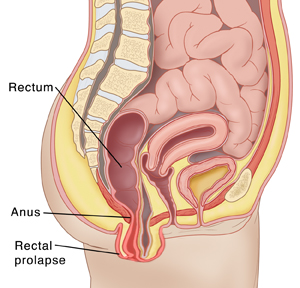Rectal Prolapse
Rectal prolapse means the rectum has fallen out of position. This happens when the rectum becomes stretched out, pushes down, and may sag out through the anus. A reddish mass of tissue may be seen or felt at the opening of the anus. The tissue may stick out beyond the anus. This may happen after a bowel movement and then go away for a time. Or it may be there all the time. Stool or mucus may also leak out of the anus.
Rectal prolapse happens when the structures and muscles in the pelvis and anus are weakened. It's not common. In most cases, the cause is unknown. It occur more often in older women. But it can happen to people of all ages. Pregnancy and childbirth can make it more likely. So can chronic constipation and repeated straining to have a bowel movement.
Often people have a hemorrhoid, which they think is a prolapse. That's because they see or feel something that's not normal, and many of the symptoms are the same.
Symptoms of a rectal prolapse include:
-
Diarrhea or constipation.
-
Stool leaking out (fecal incontinence).
-
Mucus or blood in the stool.
-
Incomplete bowel movements or a feeling that the bowel is not completely empty.
-
Belly (abdominal) or rectal discomfort.
-
Having discomfort, irritation or pain, bleeding, or itching in the anus.
-
Feeling a bulge or having a bowel movement after coughing, sneezing, lifting.
Talk with your health care provider before trying to return the rectum back into place with gentle pressure. It will likely prolapse again. For long-term treatment, you may need surgery. In some people, other organs also prolapse, such as the bladder or uterus. You'll likely be referred to a specialist who can examine you and tell you about your treatment options.

Home care
Straining during bowel movements is often a cause of prolapse. To help ease and prevent constipation, take these steps:
-
Laxatives, stool softeners, or bulking agents may be prescribed. Take them as directed. You may need them daily.
-
Add more fruits, vegetables, and whole grains to your diet. Eat less high-fat foods and processed foods such as packaged snack foods. You may take a fiber supplement if you're not getting enough fiber in your diet. The goal is 20 to 30 grams of fiber daily.
-
Don't ignore the urge to have a bowel movement. Once a day, set aside time after a meal for an undisturbed visit to the toilet.
-
Don't strain or push hard to pass stool.
-
Don't spend more than a few minutes on the toilet to have a bowel movement.
-
Do not smoke. If you need help quitting, talk to your doctor about stop-smoking programs and medicines. These can increase your chances of quitting for good.
If you have a prolapse, contact your health care provider. Your doctor may have shown you how to return a prolapsed rectum back into place. If so, follow their instructions carefully. If you have any pain or discomfort, can't easily push the prolapse back, or are not comfortable doing so, call your provider. Or go to the emergency room.
Follow-up care
Follow up with your health care provider, or as advised. If you've been referred to a specialist, make the appointment right away.
Call 911
Call 911 if:
-
You are bleeding heavily.
-
You faint or lose consciousness.
-
You have a rapid heart rate.
When to get medical care
Call your health care provider right away if:
-
The prolapse returns.
-
Your rectal prolapse can't be pushed back inside the body.
-
You have a fever of 100.4°F (38°C) or higher, or as advised by your provider.
-
You have blood in your stool.
-
You have belly pain, rectal pain, or swelling.
-
You have repeated vomiting.
-
You can't have a bowel movement or can't control your bowel movements.